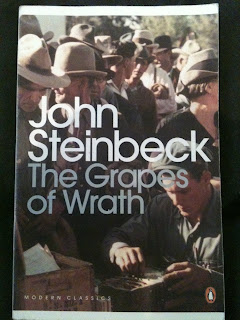 The book follows the family from their farm in Oklahoma, where the land has been over farmed at the request of banks to the point where it isn’t possible to make a living any more. Evicted from the farm, they are forced to head west following rumours of plentiful work, excellent living conditions and a good life. From the title of the book you may be able to guess this isn’t what they find.
The book follows the family from their farm in Oklahoma, where the land has been over farmed at the request of banks to the point where it isn’t possible to make a living any more. Evicted from the farm, they are forced to head west following rumours of plentiful work, excellent living conditions and a good life. From the title of the book you may be able to guess this isn’t what they find. When the book was released it caused a huge outrage, with claims that Steinbeck was exaggerating the camps that had grown on the west coast at the time to make a profit from the book. For someone who wasn’t aware of the situation (i.e. me), it would be easy to see where these claims come from: The conditions in the book are horrific, with the Joads forced to give up everything in the hope of work, they are frequently starving, live in cramped conditions and death and loss surround them. A bit of research after reading revealed that Steinbeck in reality played down the condition of the camps in the book for fear the truth would infringe upon the story. It made me feel slightly ashamed that I wasn’t aware of this happening during the recession, not that I was around to help prevent it at the time, of course.
While the book is an angry, direct attack on the land owning classes, big business and the law enforcement, it also is a testament to the human spirit. Even when forced to go through the most degrading actions imaginable (one scene at the end of the book in particular made me squirm more than a human centipede ever could) the family do so with dignity, and they do so together, as a family.
The book is one of the most widely read in 20th Century American Literature and won the nobel prize for Steinbeck. I really cant recommend it enough. It’s tough going, and I cant promise a happy ending, but the anger that drives the book compels you to read on. Give it a shot.